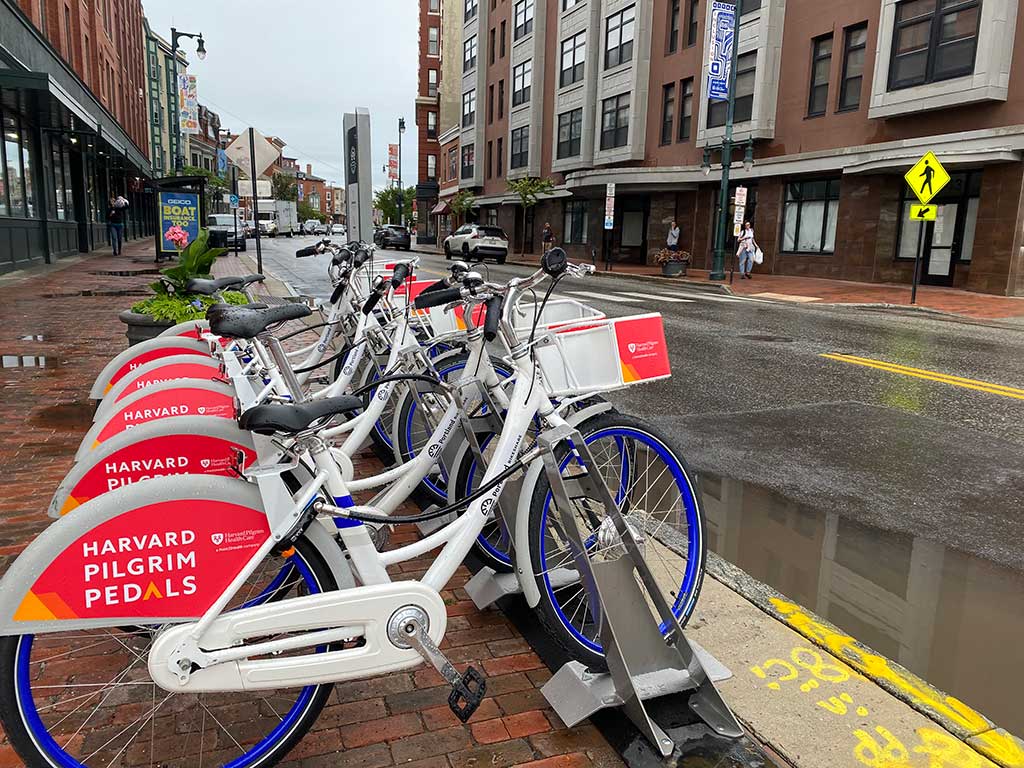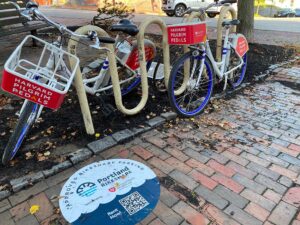By Colin Monahan

-Photo of Congress Street docking station by Tony Zeli (Aug. 2022)
The concept of a bike share is nothing novel to the City of Portland nor its bike advocates. Over the past decade Portland has seen a revolving door of competitive companies and nonprofits seeking to establish their system. Tandem Mobility, a private bike share operator from Grand Rapids, Michigan, finally won a contract with the City in 2021. Their inaugural bikes hit Portland’s streets in August of 2022 and will return after a winter hiatus in April.
Tandem Mobility’s success with the City of Portland can partially be attributed to the trials and tribulations of its predecessors’ dedication to bike accessibility.
An Exceptional City
In 2013, the US Environmental Protection Agency selected Portland amongst forty-two other communities nationwide to receive the Building Block for Sustainable Communities technical assistance award. The EPA award sought to stimulate sustainable local economic growth through public health and environmental stewardship. The focal point was a feasibility study of how bike share might fit into a community like Portland.
This study found that Portland is exceptionally characteristic of a city ready to implement a bike share program. The study cited its growing network of mixed-use paths; nearly 12,000 students within 3.5 miles of the city center; existing policies supportive of bicycling (such as the Complete Streets policy); and a compact, dense, walkable urban environment. Yet, a 2014 study conducted by Journey to Work found that Portland residents seldom ride their bikes to work. The average Portland resident’s commute to work is 2.8 miles, but two-thirds of Portland’s commuters drive alone. In fact, only 3% take public transit and only 2% ride bikes.
The first semblance of a bike share occurred that same year. It was a partnership between Northern New England Passenger Rail Authority (NNEPRA) and Zagster, a Boston based venture-funded bike share. Ten ‘Breezer’ bikes were available at the Thompson’s Point Amtrak Downeaster station. Many riders complained of clunky gears and heavy bikes, especially biking uphill from Thompson’s Point. The program disbanded two seasons later.
Portland Bike Share – The Nonprofit Approach
In the years following the Zagster project, a homegrown local non-profit, Portland Bike Share, arrived. Portland Bike Share’s non-profit model sought to launch in 2018 with fifty bikes and four stations.
But in 2016, predominantly for-profit bike share models had been growing at an astounding rate across the nation. As of that year, the National Association of City Transportation Officials (NACTO) reported a total of 48 million trips completed in fifty-five cities on 42,000 bikes. In 2021, 47 million trips had been completed.
Portland Bike Share disbanded in 2019. Posting on their Facebook, they stated that “venture capital-backed private companies” offering “no cost” technology to cities had rendered their non-profit model untenable.
Growing Support
By 2021 there had been overwhelming support for a bike share in Portland. A survey conducted by the Portland Chamber of Commerce distributed in March of 2021 found 78% of respondent businesses strongly supported a bike share system. In addition, 71% would promote bike share use among their employees. And 30% of businesses would consider sponsoring a bike station near their storefronts.
In 2019, the year Portland Bike Share dissolved, the City of Portland released two RFP’s for separate bike share companies for a 2019 and 2020 launch, respectively. One of the two companies was JUMP by Uber. The two RFP’s offered never came to fruition. However, a third RFP was offered in 2021 to Tandem Mobility.

“We selected them based on their upfront acknowledgement of the need for sponsorships and a long-term need for financial stability, as well as their approach in terms of engaging the community,” said Bruce Hyman, the City of Portland’s Transportation Program Manager. “Their approach is not to helicopter into a community and drop three hundred bikes. We were very particular about wanting to make sure that each bike trip needed to begin and end at a designated lock-to location. We did not want bikes strewn all over the place, blocking curb ramps and building entrances, which has happened in so many other communities,” said Hyman.
Praise for Bike Share
Many bike advocacy groups are pleased with the implementation of a bike share program.
“The more bikes you can have on the road, the safer it is for everybody using the road. If you go to places where there’s really good bike infrastructure, you see that the drivers are used to interacting with them and proactively thinking about sharing the road. Bringing more bikes into the mix drives infrastructure, good infrastructure drives more bikes,” said Jean Sideris executive director of the Bicycle Coalition of Maine.
“As a year-round bike commuter, if it’s within a fifteen-minute driving radius of my house, I’m hopping on my bike without batting an eye”, said Landis Hackett, a West End resident and bike advocate. “A bike share is just one piece of making our city more bike friendly. It would be awesome to see a wider-spread and more consistent network of designated bike lanes around the city. The more connected and consistent the network can be, the more approachable a bike share will become to those on the fence about whether to bike or drive around town on any given sunny afternoon,” said Hackett.
Looking Ahead 2023
Tandem Mobility is planning on operating two hundred pedal bikes and fifty electric assisted bikes across twenty-seven docking stations. They will all be located on the peninsula. There have been conversations about expanding into South Portland and neighboring towns in the following years.
“We’re hopeful that this next season, which is April through November, will give us a better sense of the overall demand. We worked out a lot of the kinks in the system last year so we should be able to hit the ground running pretty smoothly when we launch in April,” said Hyman.
If you have any suggestions for improvements or potential bike station locations, you can contact Bruce Hyman at bhyman@portlandmaine.gov.




